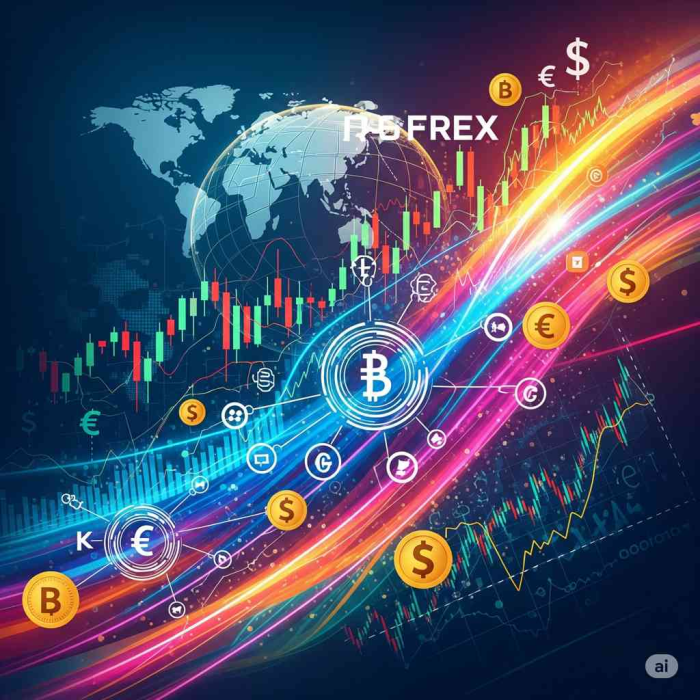The Blockchain Revolution | Reshaping the Future of Forex Trading
The foreign exchange (forex) market, a colossal and intricate global network, has long been the backbone of international trade and finance. However, its traditional infrastructure, reliant on a multitude of intermediaries and often burdened by slow settlement times and high costs, is ripe for disruption. Enter blockchain technology, the innovative force behind cryptocurrencies, which is now poised to revolutionize the way currencies are traded.

What makes blockchain a game-changer for forex?
At its core, blockchain is a decentralized, distributed ledger that records transactions in a secure, transparent, and immutable manner. This fundamental architecture offers several compelling advantages for the forex market:
- Faster Transactions and Real-time Settlement: Traditional cross-border forex transactions can take days to settle due to the involvement of multiple banks and clearing houses. Blockchain, by eliminating many of these intermediaries and automating processes through smart contracts, can facilitate near-instantaneous settlement. Imagine trading currencies and having the funds settled in minutes, not days – a significant advantage in a fast-paced market.
- Lower Transaction Costs: The current forex system involves various fees levied by intermediaries. By reducing the number of parties involved and streamlining operations, blockchain can drastically cut down on transaction costs, making forex trading more accessible and profitable for individuals and institutions alike.
- Increased Transparency and Security: Every transaction on a public blockchain is recorded and viewable by all participants, creating an unparalleled level of transparency. This immutability of records minimizes the risk of fraud, data manipulation, and disputes. For a market sometimes criticized for its opacity, blockchain offers a "chain of trust" that can enhance confidence.
- Enhanced Liquidity through Stablecoins and Tokenization: Stablecoins, cryptocurrencies pegged to the value of fiat currencies like the US dollar, offer a stable digital asset for forex traders. This allows for on-chain settlement without the need for constant conversion to fiat. Furthermore, the tokenization of fiat currencies themselves could create a more efficient and liquid environment for trading.
- Opportunities for Decentralized Forex (DeFi Forex): Decentralized Finance (DeFi) platforms leverage blockchain to enable peer-to-peer forex trading without the need for traditional brokers. This opens up new avenues for global participation, potentially fostering greater financial inclusion and reducing barriers to entry.
- Automated Processes with Smart Contracts: Smart contracts are self-executing agreements whose terms are directly written into code. In forex, they can automate various processes like trade execution, payment reconciliation, and dispute resolution, further increasing efficiency and reducing human error.
Current Explorations and Real-World Examples:
Major financial institutions are already exploring and implementing blockchain solutions. HSBC, for instance, utilizes its "FX Everywhere" system, a blockchain-based platform, to streamline foreign exchange transactions across its global hubs, processing billions of dollars in trades daily. Central banks worldwide are also researching Central Bank Digital Currencies (CBDCs), which are essentially blockchain-based versions of national currencies, indicating a growing acceptance of this technology within traditional finance.
Challenges on the Horizon:
While the potential is immense, the widespread adoption of blockchain in forex isn't without its hurdles:
- Scalability: Current blockchain networks need to improve their capacity to handle the massive volume of transactions characteristic of the forex market.
- Regulatory Uncertainty: The regulatory landscape for blockchain and cryptocurrencies is still evolving globally, creating a complex environment for institutions to navigate. Harmonized international regulations will be crucial for broader adoption.
- Interoperability: Ensuring seamless communication and transaction flow between different blockchain networks and with existing legacy systems remains a technical challenge.
- Integration with Legacy Systems: The extensive and deeply entrenched traditional financial infrastructure requires significant effort and investment to integrate with new blockchain-based solutions.
The Future of Forex: A Hybrid Ecosystem?
It's unlikely that blockchain will entirely replace the traditional forex market overnight. Instead, the future probably lies in a hybrid ecosystem where blockchain technology integrates with existing infrastructure, acting as a powerful engine to enhance transparency, efficiency, and security. As advancements in scalability, interoperability, and regulatory clarity progress, blockchain is set to become an increasingly integral part of the global foreign exchange landscape, paving the way for a more efficient, secure, and accessible financial future.
Popular Tags